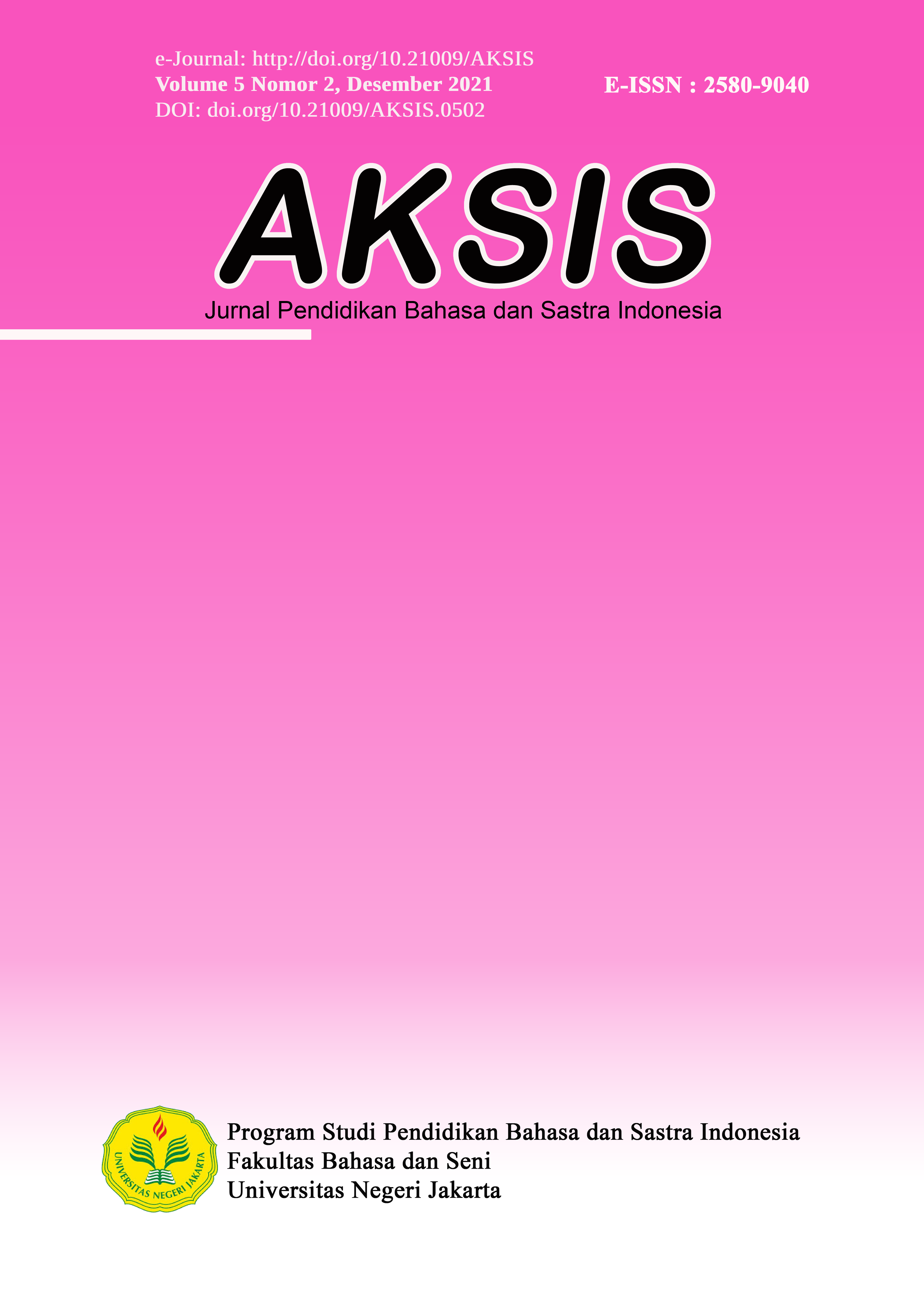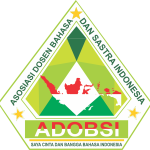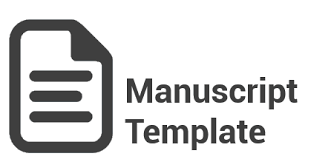Student Perceptions on Online Learning for Indonesian General Course In The Pandemic Covid-19 Phase
Abstract
The Covid-19 pandemic has had an impact on the education sector. The government's efforts to break the chain of the spread of the Covid-19, which is growing massively, is by implementing an online learning policy. This study aims to determine student perceptions of online learning for Indonesian general courses in the Covid-19 pandemic phase. This study uses a survey method approach with a descriptive nature which aims to describe the situation or phenomenon that occurs. The subjects of this study were Sebelas Maret University students who were active in the odd semester of the 2021/2022 academic year, totaling 124 students. Data collection techniques were carried out by distributing questionnaires filled out online by students. The results showed that online learning can be accessed easily (66.1% agree), provide high learning motivation (48.4% agree and 48.4% disagree), online learning does not provide high learning motivation (50.8 % agree), carried out on time according to the study schedule (63.7% agree), learning materials are presented in accordance with the syllabus (71.8% agree), the lecturer responds to questions and opinions that arise (64.5 % agree), the lecturer gives you the opportunity to give questions or opinions (62.9% agree), online learning makes me believe the value of the Indonesian general courses that are followed increases (67.7% agree), the media/application used is very good easy to use (78.2% agree), easy to collect assignments and exams online (69.4% agree). It can be concluded that online learning for Indonesian general courses in the Covid-19 pandemi phase received a good response from students and it is recommended that lecturers always provide motivation to students.
References
Arikunto, S. (2010). Prosedur Penelitian Suatu Pendekatan Praktik. Rineka Cipta.
Bączek, M. Z., Szpringer, M., Jaroszyński, A., & Wożakowska-Kapłon, B. (2021). Students’ perception of online learning during the COVID-19 pandemic: A survey study of Polish medical students. Journal Medicine, 100(7). https://doi.org/10.1097/MD.0000000000024821. PMID: 33607848; PMCID: PMC7899848.
Bartley, S. J., & Golek, J. H. (2004). Evaluating the cost effectiveness of online and face-to face instruction. Journal Educational Technology and Society, 7(4), 167-175.
Bhagat, K. K., Wu, L. Y., & Chang, C. Y. (2016). Development and validation of the perception of students towards online learning (POSTOL). Journal Educational Technology and Societyechnology and Society, 19(2), 350–359.
Cahyawati, D., & Gunarto, M. (2020). Persepsi mahasiswa terhadap pembelajaran daring pada masa pandemi Covid-19: Hambatan, tingkat kesetujuan, materi, beban tugas, kehadiran, dan penjelasan dosen. Jurnal Innovis Teknologi Pendidikan, 7(2), 150–161. https://doi.org/https://doi.org/10.21831/jitp.v7i2.33296.
Clarke, T., & Hermens, A. (2001). Corporate developments and strategic alliances in e-learning. Journal Education and Training, 43(4), 256–267. https://doi.org/10.1108/00400910110399328
Conrad, D. (2002). Deep in the hearts of learners: Insights into the nature of online community. Journal of Distance Education, 17(1), 1–19.
Cucinotta, D., & Vanelli, M. (2020). WHO declares COVID-19 a pandemic. Acta Biomed, 91(1), 157–160. https://doi.org/10.23750/abm.v91i1.9397.
Direktur Jenderal Pendidikan Tinggi Departemen Pendidikan Nasional RI. (2006). Keputusan DirekturJenderal Pendidikan Tinggi Depatermen Pendidikan Nasional Republik Indonesia Nomor 43/DIKTI/Kep/2006 tentang Rambu-Rambu Pelaksanaan Kelompok Mata Kuliah Pengembangan Kepribadian di Perguruan Tinggi. Departemen Pendidikan Nasional Republik. http://luk.staff.ugm.ac.id/atur/SKDirjen43-DIKTI-Kep-2006.pdf
Dopo, F. B., & Ismaniati, C. (2016). Persepsi guru tentang digital natives, sumber belajar digital dan motivasi memanfaatkan sumber belajar digital. Jurnal Innovis Teknologi Pendidikan, 3(1), 13–24. https://doi.org/https://doi.org/10.21831/tp.v3i1.8280.
Dumford, A. D., & Miller, A. L. (2018). Online learning in higher education: Exploring advantages and disadvantages for engagement. Journal of Computing in Higher Education, 30(1), 452–465. https://doi.org/https://doi.org/10.1007/s12528-018-9179-z
Firman, F., & Rahman, S. R. (2020). Pembelajaran Online di Tengah Pandemi Covid-19. Indonesian Journal of Educational Science (IJES), 2(2), 81–89. https://doi.org/https://doi.org/10.31605/ijes.v2i2.659
Fitriyani, Y., Fauzi, I., & Sari, M. Z. (2020). Motivasi Belajar Mahasiswa pada Pembelajaran Daring Selama Pandemik Covid-19 , 7(1), 121–132.doi: Jurnal Profesi Pendidikan Dasar, 7(1), 121–132. https://doi.org/https://doi.org/10.23917/ppd.v7i1.10973
Hidayat, R., Khotimah, K., & Saputra, A. (2019). Mata Kuliah Wajib Umum Bahasa Indonesia di Perguruan Tinggi: Sebuah Tawaran Model Pembelajaran. Jurnal Ilmiah Telaah, 4(5), 31–35.
Ibrahim, A. M. (2021). Varian Delta di RI Capai 4.732 Kasus, Bali Naik 2 Kali Lipat. CNN Indonesia. https://www.cnnindonesia.com/nasional/20211115100745-20-721203/varian-delta-di-ri-capai-4732-kasus-bali-naik-2-kali-lipat
Irawan, S., & Listyaningsih, L. (2021). Persepsi Mahasiswa terhadap Pembelajaran Daring. Scholaria: Jurnal Pendidikan Dan Kebudayaan, 11(3), 216–225.
Kementerian Pendidikan dan Kebudayaan Republik Indonesia. (2020). Surat Edaran Nomor 4 Tahun 2020 tentang Pelaksanaan Kebijakan Pendidikan dalam Masa Darurat Penyebaran Corona Virus Disease (Covid-19). Kementerian Pendidikan Dan Kebudayaan Republik Indonesia. https://pusdiklat.kemdikbud.go.id/surat-edaran-mendikbud-no-4-tahun-2020-tentang-pelaksanaan-kebijakan-pendidikan-dalam-masa-darurat-penyebaran-corona-virus-disease-covid-1-9/
Kilby, T. (2001). The direction of beb-based training: A practitioner’s view. The Learning Organization, 8(5), 194–199. https://doi.org/10.1108/EUM0000000005912
Laili, R. N., & Nashir, M. (2021). Higher Education Students ’ Perception on Online Learning during Covid19 Pandemic. Edukatif: Jurnal Ilmu Pendidikan, 3(3), 689–697. https://doi.org/https://doi.org/10.31004/edukatif.v3i3.422
Langford, M., & Damsa, C. (2020). Online Teaching in the Time of Covid-19 Academics’ experiences in Norway. Center for Experiental Legal Learning (CELL) University of Oslo.
Maknuni, J. (2020). Pengaruh Media Belajar Smartphone terhadap Belajar Siswa di Era Pandemi Covid-19. Indonesian Education Administration and Leadership Journal (IDEAL), 2(2), 94–106.
Mansyur, U. (2019). Sikap Bahasa Mahasiwa dan Implikasinya terhadap Pembelajaran Bahasa Indonesia di Perguruan Tinggi. GERAM: Gerakan Aktif Menulis, 7(2), 71–77.
Maulana, H. A., & Hamidi, M. (2020). Persepsi Mahasiswa terhadap Pembelajaran Daring pada Mata Kuliah Praktik di Pendidikan Vokasi. Equilibrium: Jurnal Pendidikan, 8(2), 224–231. https://doi.org/https://doi.org/10.26618/equilibrium.v8i2.3443
Moskowitz, M. J., & Orgel, A. R. (1969). General Psychology: A Core Text in Human Behavior. Houghton Mifflin Company.
Mustofa, M. I., Chodzirin, M., & Sayekti, L. (2019). Formulasi Model Perkuliahan Daring sebagai Upaya Menekan Disparitas Kualitas Perguruan Tinggi. Walisongo Journal of Information Technology, 1(1), 151–160. https://doi.org/http://dx.doi.org/10.21580/wjit.2019.1.2.4067
Nugroho, S. (2015). Profesionalisme Guru SD Negeri Se-Kecamatan Warungasem Kabupaten Batang: Suatu Tinjauan Aspek Persepsi Guru tentang Kepemimpinan Kepala Sekolah dan Motivasi Berprestasi Guru. Jurnal VARIDIKA, 24(2), 135–146. https://doi.org/10.23917/varidika.v24i2.710
Nuriansyah, F. (2020). Efektifitas Penggunaan Media Online dalam Meningkatkan Hasil Belajar pada Mahasiswa Pendidikan Ekonomi Saat Awal Pandemi Covid-19. Jurnal Pendidikan Ekonomi Indonesia, 1(2), 61–65.
Nurlia, & Anggo, A. (2021). Persepsi Mahasiswa Pendidikan Biologi terhadap Perkuliahan Daring pada Masa Pendi Covid-19. Bioedusiana: Jurnal Pendidikan Biologi, 6(1), 61–69. https://doi.org/https://doi.org/10.37058/bioed.v6i1.2925
Nurtjahjanti, Harlina, Praseyto, A. R., & Ardhiani L.N. (2020). Role of Resilience and Readiness for Change on Students’ Interest in Learning: E-Learning Implementation During Covid-19. Jurnal Cakrawala Pendidikan, 40(3), 80–91.
Prasetya, T. A., & Harjanto, C. T. (2020). Pengaruh Mutu Pembelajaran Online dan Tingkat Kepuasan Mahasiswa terhadap Hasil Belajar Saat Pandemi Covid-19. Jurnal Pendidikan Teknologi Dan Kejuruan, 17(2), 188–197. https://ejournal.undiksha.ac.id/index.php/JPTK/article/view/25286
Raharja, U., Lutfiani, N., Handayani, I., & Suryaman, F. M. (2019). Motivasi Belajar Mahasiswa terhadap Metode Pembelajaran Online iLearning+ pada Perguruan Tinggi, 9(2), 192. Jurnal Sisfotenika, 9(2), 192–201. https://doi.org/https://doi.org/10.30700/jst.v9i2.497.
Rio, C. D., & Malani, P. N. (2020). 2019 Novel Coronavirus-Important Information for Clinicians. JAMA, 323(22), 1039–1040. https://doi.org/10.1001/jama.2020.1490.
Rusdiantho, K. S. G., & Elon, Y. (2021). Persepsi Mahasiswa terhadap pembelajaran Online Fase Pandemic Covid-19. Edukatif: Jurnal Ilmu Pendidikan, 3(5), 2573–2585. https://doi.org/https://doi.org/10.31004/edukatif.v3i5.899.
Sarwono, S. W. (2012). Psikologi Remaja. Raja Grafindo Persada.
Singh, V., & Thurman, A. (2019). How Many Ways Can We Define Online Learning? A Systematic Literature Review of Definitions of Online Learning (1988-2018). American Journal of Distance Education, 33(4), 289–306. https://doi.org/https://doi.org/10.1080/08923647.2019.1663082
Sirjon, Setyaningsih, D., Mulyanie, E. S., & Mamma, A. T. (2021). Persepsi Mahasiswa terhadap Pembelajaran Daring pada Masa Pendemi Covid-19 dan Hubungannya dengan Partisipasi Mahasiwa dalam Pembelajaran di Program Studi PG PAUD Universitas Cenderawasih. Eduka: Jurnal Pendidikan, Hukum, Dan Bisnis., 1(1), 1–12.
Smaldino, S. E., James, D. R., Roberts, H., & Michael, M. (2005). Instructional Technology and Media for Learning (8th Editio). Pearson.
Sobron, A. N., Bayu, R., Rani, & Meidawati. (2019). Persepsi siswa dalam studi pengaruh daring learning terhadap minat belajar IPA. Scaffolding: Jurnal Pendidikan Islam Dan Multikulturalisme, 1(2), 30–38. https://doi.org/https://doi.org/10.37680/scaffolding.v1i2.117.
Sumarmi, S., Bachri, S., Y., I. L., Aliman, M., & Ahmad, W. I. X. (2021). Project-based research learning (PBRL) tntegrated with e-learning in projects completion. International Journal Emerging Technologies in Learning, 16(7), 16. https://doi.org/https://doi.org/10.3991/ijet.v16i07.21 193
Tim Investigasi Covid-19 RI. (2021). Data Sebaran Virus Covid-19 di Indonesia. Covid19.Go.Id. https://covid19.go.id/
Tung, K. Y. (2000). Pendidikan dan Riset di Internet. Dinastindo.
Varre, C., Keane, J., & Irvin, M. J. (2010). Enhacing online distance education in small rural US schools: a Hybrid, learner-centered model. Reasearch in Learning Technology, 18(3), 195–205. https://doi.org/10.24059/olj.v15i4.205
Walgito, B. (1994). Psikologi Sosial: Suatu Pengantar. Andi.
Yuniarti, R., & Hartati, W. (2020). Persepsi mahasiswa tentang penerapan e-learning pada masa darurat Covid-19. Jurnal Publikasi STKIP PGRI, 6(2), 158–167. http://publikasi.stkippgri-bkl.ac.id/index.php/APM/article/view/377
Zhafira, N. H., Ertika, Y., & Chairiyaton. (2020). Persepsi mahasiswa terhadap perkuliahan daring sebagai sarana pembelajaran selama masa karantika Covid-19. Jurnal Bisnis Dan Kajian Strategi Manajemen, 4(1), 37-45.






